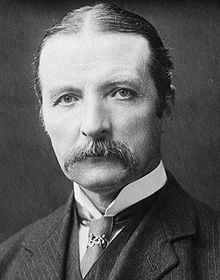William Archer (critic)
This article needs additional citations for verification. (August 2013) |

William Archer (23 September 1856 – 27 December 1924) was a Scottish critic and writer.
Life
He was born in Perth, the son of Thomas Archer. He spent large parts of his boyhood in Norway where he became acquainted with the works of Henrik Ibsen,[1] and was later educated at the University of Edinburgh, where he received the degree of M.A. in 1876.[2]
Archer became a leader-writer on the Edinburgh Evening News in 1875, and after a year in Australia returned to Edinburgh. In 1878 he took up residence in London.[3] In 1879 he became dramatic critic of the London Figaro, and in 1884 of the World, where he remained until 1905. In London he soon took a prominent literary place and exercised much influence.[2]
Archer had much to do with introducing Henrik Ibsen to the English public with his translation of The Pillars of Society, produced at the Gaiety Theatre, London, 1880. It was the first Ibsen play to be produced in London but made little impression.[4] He also translated, alone or in collaboration, other productions of the Scandinavian stage: Ibsen's A Doll's House (1889), The Master Builder (1893, with Edmund Gosse); Edvard Brandes's A Visit (1892); Ibsen's Peer Gynt (1892, with Charles Archer); Little Eyolf (1895); and John Gabriel Borkman (1897); and he edited Henrik Ibsen's Prose Dramas vols., 1890–1891).[2]
In 1897 Archer, along with Elizabeth Robins, Henry William Massingham, and Alfred Sutro, formed the Provisional Committee to organize an association to produce plays of high literary intrinsic merit, such as Ibsen's. The association was called the "New Century Theatre" but was a disappointment by 1899, although it continued until at least 1904.[citation needed] In 1899, a more successful association, called the Stage Society, was formed to replace it.[5]
Max Beerbohm's caricature of Archer paying a humble visit to Henrik Ibsen was published in The Poets’ Corner, London 1904.[6]
Archer was a friend of George Bernard Shaw, and arranged for his plays to be translated into German. An attempted collaboration on a play, Widower's Houses, did not work, however, and Archer was often critical of Shaw's drama. For a time, Archer lived at 27 Fitzroy Square in central London, while Shaw lived at number 29.[citation needed]
During World War I, Archer wrote a series of open letters on behalf of Wellington House, arguing Germany's culpability in starting the conflict. He viewed the Allies (including England) as innocent bystanders, forced into defending the world against German militancy.[citation needed]
He was one of the founders of the English Spelling Society in 1908.[7] A biography by P. Whitebrook was published in 1993. [8]
Archer's play The Green Goddess was produced by Winthrop Ames at the Booth Theatre in New York in 1921. It was a melodrama, and a popular success, although relatively of much less importance to the art of the drama than his critical work.[citation needed]
Works
Critical works
- English Dramatists of To-day (1882)
- Henry Irving, a study (1883)
- About the Theatre (1886)
- Masks or Faces? A Study in the Psychology of Acting (1888)
- W. C. Macready, a biography (1890)
- "The Theatrical World" (1893) (5 volumes)
- America To-day, Observations and Reflections (1900)
- Poets of the Younger Generation (1901) John Lane, the Bodley Head, London
- Real Conversations (1904)
- A National Theatre: Scheme and Estimates, with H. Granville Barker, (1907)
- Through Afro-America (1910)
- The Life, Trial, and Death of Francisco Ferrer (1911)
- Play-Making (1912)[9]
- India and the Future (1917)
- The Old Drama and the New (1923)
Essays
- The Great Analysis: A Plea for a Rational World-Order (1912). Introduction by Gilbert Murray[10]
Plays
- War is War (1919)
- The Green Goddess (1921)
Notes
- ^ The Oxford Companion to English Literature, 6th Edition. Edited by Margaret Drabble, Oxford University Press, 2000 Pp37
- ^ a b c Chisholm 1911.
- ^ "Archer, William". Who's Who. Vol. 59. 1907. p. 51.
- ^ The Oxford Companion to English Literature, 6th Edition. Edited by Margaret Drabble, Oxford University Press, 2000 Pp 37
- ^ Woodfield, James (1984). English theatre in transition, 1881-1914. pp. 56–58.
- ^ The Poet's Corner[1]
- ^ Spelling Society: Inaugural Minutes 1908.
- ^ The Oxford Companion to English Literature, 6th Edition. Edited by Margaret Drabble, Oxford University Press, 2000 Pp38
- ^ William Archer (1912). Play-making: A Manual of Craftsmanship. Small, Maynard. Retrieved 2 February 2016.
- ^ Google Books
References
- This article incorporates text from a publication now in the public domain: Chisholm, Hugh, ed. (1911). "Archer, William". Encyclopædia Britannica. Vol. 2 (11th ed.). Cambridge University Press.
External links
 Works by or about William Archer at Wikisource
Works by or about William Archer at Wikisource- William Archer on SF Encyclopedia
- Works by William Archer at Project Gutenberg
- Works by or about William Archer at the Internet Archive
- Works by William Archer at LibriVox (public domain audiobooks)

- Papers of William Archer at Edinburgh U. LIbrary
- Archer, William (1918), India and the Future, New York: Alfred A. Knopf
- Article by Martin Quinn in Dictionary of Literary Biography
